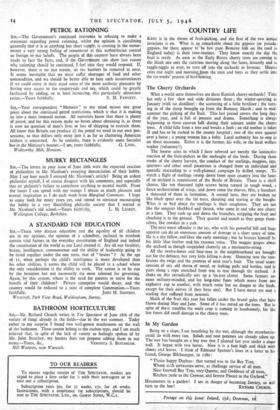The Cherry Orchards
What a world unto themselves are these Kentish cherry-orchards! Time has only a few slow and wide divisions there ; the winter-spraying in January (with tar distillate) ; the scattering of a little fertiliser ; the turn-
ing in of the sheep brought up from the Romney Marsh ; and in mid- summer the picking of the 'fruit. This last period covers the long days of the year, and is full of jmerest and -drama. Something is always happening to these caravan. folk during their sojourn under the cherry trees.. A child falls from a tree and breaks a limb ; an old mother is taken ill and has to be rushed to the county hospital ; two of the men quarrel over a horse ; a young woman has a baby. Local authority has to step in on these' occasions. Either it is the farmer, hii wife, or the local welfare worker (voluntary!).
The hoarse cries to which I have referred are merely the instinctive reaction of the fruit-pickers to the onslaught of the birds. During these weeks of the cherry harvest, the conduct of the starlings, magpies, jays, sparrows and other small passerines is changed from an individual and sporadic marauding to a well-planned campaign by drilled troops. To watch a flight of starlings swoop down from open country into the heart of an orchard is reminiscent of the Battle of Britain. There is a shrill chorus, like ten thousand tight screws being turned in tough wood, a fierce orchestration of wings, and down come the thieves, fifty, a hundred, a thousand of them in formation. A second later, they are broken up like black spray over the fat- trees, .shouting and tearing at the boughs. What is so bad about the starlings is their roughness. They are not like the songter blackbird and thrush, who come in and take one cherry at a time. They rush up and down the branches, stripping the fruit and chucking it to the ground. They quarrel and snatch as they gorge them- selves, like rowdies in a pub.
The next worst offender is the jay, who with his powerful bill and huge appetite can do an enormous amount of damage in a short space of time. He is a shy fellow, and likes the early morning; but he betrays himself by his little blue feather and; his raucous voice. The magpie gropes about the orchard as though suspended clumsily on a marionette-string.
All the twelve-bores and four-tens in the neighbourhood are brought out for the defence, but very little killing is done. Shooting into the trees bruises the twigs and the promise of next year's fruit. The usual soarer consists of any old sheets. of metal, or leaking pails and kettles, tied in pairs along a rope stretched from tree to tree through the orchard. A shake on this periodically sets up a tin-pan clatter. Some farmers are more military-minded, and lay long-time fuses which move from one explosive cap to another, with much noise but no danger to the 'birds, except for their nerves (if they have any). But I have never yet met a starling that suffered from neurosis. Much of the fruit this year has fallen under the brutal gales that have blown during May and June. Some-of it has rotted on the trees. But in spite of these troubles the main crop is coming in handsomely, for the late frosts did small damage to the cherry trees.


























 Previous page
Previous page